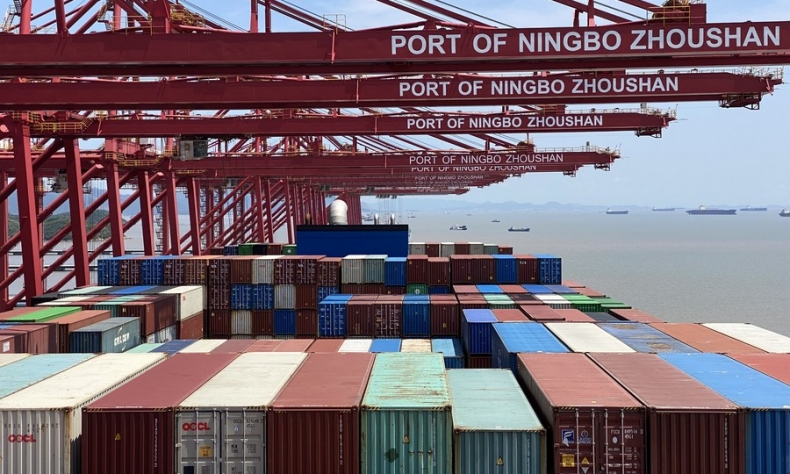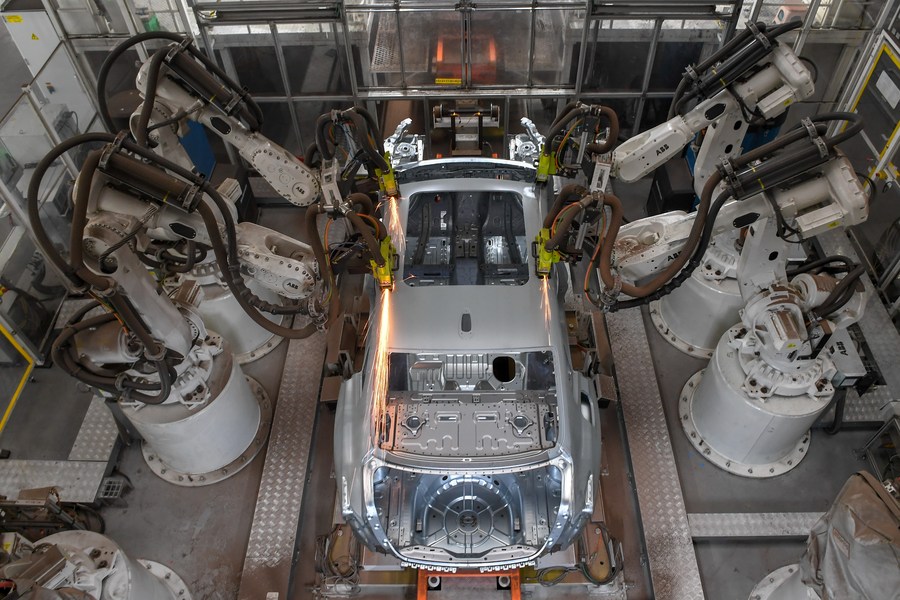Still an Anchor

China is playing an increasingly prominent role as a flagbearer of global free trade, which has injected growth momentum into its own economy and the world’s amid global turmoil and economic recession.
This year the global community continues to face recession as well as political and security instabilities. According to the World Economic Outlook report released by the International Monetary Fund in October, the global economy saw a year-on-year growth of 3.5 percent in 2022, with the growth rates of developed economies and emerging markets and developing economies reaching 2.6 percent and 4.1 percent, respectively.
The global economy grew 3 percent this year. Developed economies are expected to grow at 1.5 percent on a yearly basis, and emerging markets and developing economies, at 4 percent. Global growth will likely drop to 2.9 percent in 2024, the report said.
In the current economic, political and security landscape, China’s policy decisions will have an irreplaceable impact on the stability and vitality of the global economy and trade.
At a meeting held by the Political Bureau of the Communist Party of China Central Committee on December 8, it emphasized that the government needs to promote reform, expand high-standard opening up and consolidate the overall performance of foreign trade and foreign investment.
It also urged efforts to lead the development of a modern industrial system through scientific and technological innovations, and improve the resilience and security of industrial and supply chains.
Reinforcing the guidance provided by the Political Bureau, the annual Central Economic Work Conference held on December 11-12 called for the government’s efforts to pursue progress while ensuring stability, consolidate stability through progress, and develop new rules before abolishing the old.
The conference also highlighted the importance of using reform and opening up as a means to drive economic development. It also called on the government to make macroeconomic policies more consistent.

Rising uncertainties
Last year, central banks in many Western countries severely tightened their monetary policies. The U.S. Federal Reserve began lifting interest rates in March 2022. The measures for preventing inflation have not achieved the expected effects, but have instead led to high consumer prices and declining living standards for people in Western countries and many other economies. The measures have also affected manufacturing industries in Western economies, and resulted in risks in their financial, real estate and debt markets.
The U.S. Government’s deficit, debt, and its payment of interest have ballooned, causing great risks that endanger the international financial system. The Fed’s aggressive interest rate hikes have been beyond expectation, leading to greater-than-expected funds outflow, currency depreciation, and inflation in emerging markets.
Reasons including stagnating progress of basic science research have led the global economy into a phase of low growth and high volatility, which will last for more than a decade. The shadow of a new cold war, large regional conflicts like the Russia-Ukraine conflict, sanctions exerted on Russia, and decoupling and de-risking attempts are prolonging the phase of economic downturn and great uncertainty.
Amid economic volatility and recession, the Russia-Ukraine conflict continues, and the accompanying frenzy of sanctions and impacts on the global economy and trade are escalating. The outbreak of the Palestinian-Israeli conflict this year further threatens the global economy.
It is also worrying that there will be 40 national elections across the world next year, among which the European Parliament election, and elections in the United Kingdom and the United States are particularly important for the Western world. The results of the elections will greatly impact the global economy and trade.
China’s role
China has been a major driver of global economic growth since the beginning of the 21st century, contributing about 30 percent of global economic growth. The combined economic growth of China and the United States has accounted for half of global economic growth over the past two decades. China has been the world’s largest industrial country and the largest exporter for 14 consecutive years from 2009 and has been the world’s second largest economy since 2010. It is also a large importer with sustained and rapid trade growth.

The country has continuously opened its doors more widely to the world over recent decades. The Central Economic Work Conference highlighted the need to increase higher-level opening up. Prior to the meeting, the plan for advancing institutional opening up of the China (Shanghai) Pilot Free Trade Zone (FTZ) in alignment with high-standard international economic and trade rules was released on
December 7. On the same day, the 24th China-EU Summit was held and China signed an upgraded free trade agreement with Singapore to further boost trade and investment liberalization.
To boost mutual exchanges, China has recently signed bilateral visa-free policy agreements with many countries. The Ministry of Foreign Affairs of China has announced that Chinese embassies and consulates abroad will reduce visa fees by 25 percent from December 11, 2023 to December 31, 2024. The measures are part of the country’s efforts to expand reform and opening up to boost growth momentum and consolidate its position as an engine of global economic growth.
China’s pursuit of a high-standard open economy is evident. The Chinese Government approved the establishment of the Shanghai FTZ plan on September 18, 2013, and the use of pilot zones has increased rapidly across China’s regions. Today, the highest levels of opening up are being rolled out in FTZs nationwide. China’s FTZs are exploring new financial tools and methods of conducting trade that are leading the world. These include cross-border authentication of digital identity and electronic identification for online payment, a single-window cross-border data exchange system for paperless customs declaration, application of online bills of lading and storage, as well as the artificial intelligence technology.
China is playing an increasingly prominent role as a flagbearer of global free trade, which has injected growth momentum into its own economy and the world’s amid global turmoil and economic recession.
It is imperative for the country to face right up to risks and uncertainties while steadily expanding its opening up.
The author is a researcher at the Chinese Academy of International Trade and Economic Cooperation.
 Facebook
Facebook
 Twitter
Twitter
 Linkedin
Linkedin
 Google +
Google +










